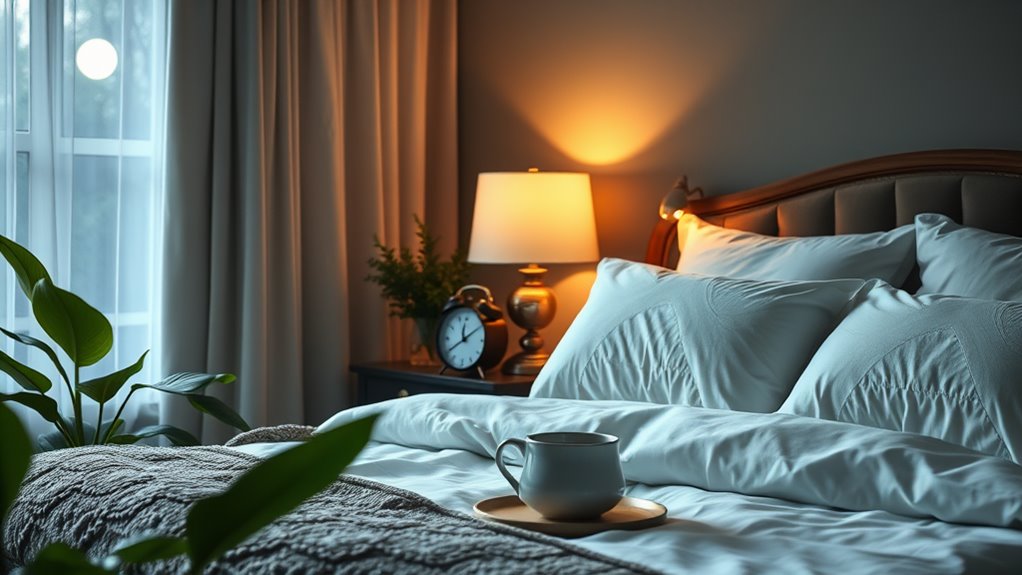
Sleep hygiene affects your physical health by ensuring the ideal conditions for restorative processes like cell repair, immune function, and hormone regulation. When you maintain good sleep hygiene, you reduce risks associated with chronic diseases such as obesity, heart disease, and diabetes. It strengthens your immune system, enhances your mental clarity, and supports weight management. Practices like regulating your sleep schedule, creating a restful environment, and limiting blue light exposure before bed greatly improve the quality of your sleep. By understanding the connection between sleep hygiene and physical health, you can access further insights into achieving long-term wellness.
Sleep’s Role in Health
Sleep plays an indispensable role in maintaining and enhancing your overall health by driving essential restorative processes. Restorative sleep is a powerful remedy, repairing cells and tissues, boosting immune function, and regulating hormones that keep you feeling balanced and alive. Embracing quality sleep liberates you from the shackles of fatigue and illness, empowering your heart and metabolism. It’s fascinating how sleep deprivation effects creep in stealthily, increasing your vulnerability to chronic ailments like obesity, heart disease, and even cancer. Insufficient sleep raises sleep debt, further exacerbating the health risks associated with chronic sleep deprivation. The lack of restorative sleep leaves your immune defenses compromised, a gateway to frequent sickness. When sleep deprivation takes hold, you’re not just dealing with drowsiness. Your motor skills diminish, making the everyday challenge of maneuvering the world fraught with risk. A sleep-friendly environment—cool, dark, and quiet—can greatly enhance the quality and duration of your rest, bolstering your immune system and overall health outcomes. But there’s good news: prioritizing restorative sleep has transformative powers, granting clarity of mind and a lighter mood. You’ll find your athletic prowess heightened, and weight management becomes more intuitive. Ideal sleep isn’t just about survival; it’s about thriving. So summon your inner rebel, refuse the chains of sleep deprivation, and claim your right to a fulfilling life. Sleep is your ally in this quest for freedom, offering the gift of vibrant health.
Factors Affecting Sleep Quality
The glow of screens and city lights doesn’t just paint the night; it invades your sleep sanctuary, tricking your internal clock and delaying your journey to slumber. This lighting influence suppresses melatonin, the hormone that signals it’s time to sleep. Incorporating gentle activities like mindfulness practices into your evening routine can help counteract these disturbances by promoting relaxation and preparing the mind for rest.
It’s not just about the light. Your environment’s safety plays a big role too. If you don’t feel safe due to excessive noise or a lack of neighborhood safety, you might find your senses on high alert, keeping you from the peaceful rest you crave. A comfortable and secure sleep environment is essential because it ensures that you can relax and ease into sleep without worrying about external disturbances or threats to your sense of safety.
Internal turmoil can be just as disruptive. Stress and anxiety, those relentless intruders, stir up your mind, and stress impact often keeps you tossing and turning. You might face sleep disorders that leave you exhausted despite hours in bed.
The food you eat and when you eat it matters. Dietary effects are real; caffeine and late-night snacks can guarantee that the Sandman skips his visit.
Finally, relentless work pressures strain your schedule and push your boundaries, eroding the sanctuary your sleep once promised.
Awareness of these factors empowers you to reclaim better sleep, crafting a restorative space where you wake rejuvenated and ready to embrace each day.
Health Benefits of Good Sleep

Understanding the factors affecting sleep quality helps you take charge of improving your rest, leading to significant health benefits when sleep patterns improve. Dodging the grip of sleep deprivation effects frees your body to heal and thrive. Chronic lack of sleep can lead to diabetes and heart disease, impairing immune function and increasing infection risk. With good sleep, you reduce your risk of chronic diseases like type 2 diabetes and heart disease, supporting a longer, healthier life. Sleep quality indicators such as regularity and duration play an essential role in weight management, helping you fend off obesity and embrace a healthy lifestyle. Adequate sleep is essential for energy and metabolic function, aiding in weight management and overall well-being.
Your immune system perks up, armed better against infections and viruses. With improved sleep, your heart reaps the benefits, lowering the risk of cardiovascular disease.
You’ll feel more rejuvenated and less clumsy, reducing the likelihood of accidents. Your mental health also flourishes with good sleep, cutting down stress and anxiety, while boosting your mood and cognitive function.
You’re sharper, more productive, and mentally agile, able to make decisions with ease. Athletically, you’ll perform better and stay safer from injuries.
Sleep can even potentially lower cancer risks and increase your lifespan. Additionally, you’ll enjoy higher energy levels, better social interactions, and an enhanced overall quality of life.
Sleep well, live free.
Understanding Sleep Hygiene
Understanding sleep hygiene starts with the sleep environment. Keep your bedroom cool, dark, and quiet. This means setting the temperature between 60°F and 67°F and using blackout curtains or eye masks to block light. Silence any noise with earplugs or a white noise machine. Maintaining a consistent sleep schedule is also important to signal your body when it’s time to wind down and rest. Regular exercise promotes better sleep patterns, which can enhance both sleep quality and overall health.
Turn your bed into a sleep sanctuary—only use it for sleep and sex to strengthen your brain’s association with rest.
Equally important is establishing a strong bedtime routine. Engage in relaxation activities before sleep. Try meditation, yoga, or gentle stretching to signal your body it’s time to wind down. Avoid stimulants like caffeine, nicotine, or alcohol to prevent sleep disruption.
Your routines should extend to how you handle screen time. Keep electronic devices out of the bedroom to minimize blue light exposure.
Crafting this perfect sleep environment and embracing a soothing bedtime routine lets you take control, both freeing your nights from restlessness and empowering your days with energetic liberation.
Test different approaches until you find your ideal balance.
Improving Sleep Habits

Improving Sleep Habits
Having grasped the essentials of creating a perfect sleep environment, the next step is to focus on improving your sleep habits. Establishing consistent sleep routines is key to achieving true liberation from restless nights. Start by setting regular sleep times, going to bed, and waking up at the same time each day. This helps regulate your body’s internal clock, promoting a more natural sleep rhythm.
Incorporating bedtime rituals can further enhance this process. Engage in calming activities like reading or meditation before bed to signal your body to prepare for rest. While naps can be tempting, avoid them close to bedtime as they can interfere with nighttime sleep.
Keep your weekends aligned with your weekday schedule—resist the urge for sleep-ins. If you need to adjust your sleep schedule, do so gradually to give your body time to adapt.
Developing healthy pre-sleep habits is essential too. Limit caffeine and electronic device use before bed. Opt for relaxing, screen-free activities to wind down, and consume light meals in the evening. Alcohol can disrupt sleep cycles by increasing awakenings later in the night, despite its initial sedative effects.
Exercising regularly can improve sleep quality, but avoid it right before bed to prevent overstimulation. By taking these steps, you pave the way to restful nights and liberated days.
Restful Sleep Promotes Wellness
Restful sleep is an essential component of physical wellness, serving as a fundamental pillar for both physical recovery and chronic disease prevention. It plays a central role in repairing and regenerating cells, fortifying the immune system, and maintaining a suite of healthy bodily functions. Chronic sleep deprivation undermines these processes, increasing susceptibility to infections and a plethora of health conditions such as diabetes and cardiovascular disease.
Beyond physical recovery, regular sleep excellently guards against chronic illnesses, reducing risks of obesity, heart disease, and type 2 diabetes. Its role in regulating hormone levels and maintaining a healthy weight underscores its importance in mitigating risks associated with high blood pressure, stroke, dementia, and even cancer.
Moreover, adequate sleep is foundational to overall health maintenance, impacting everything from brain activity to emotional well-being. It facilitates the consolidation of memories and the processing of information, essential for maintaining sharp cognitive functions and best work performance.
The absence of robust sleep can lead to impaired daily activities and increased stress and irritability, further compounding mental health issues such as anxiety and depression. Therefore, cultivating good sleep habits becomes vital for sustained physical and mental health, underscoring the symbiotic relationship between sleep quality, cognitive function, and emotional stability.














